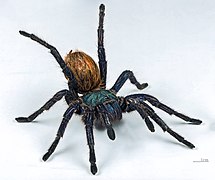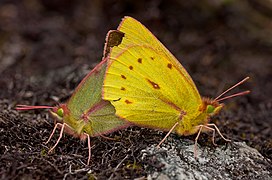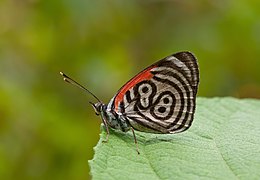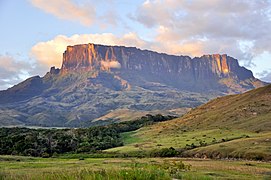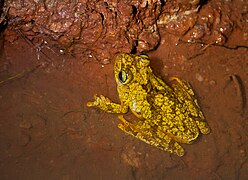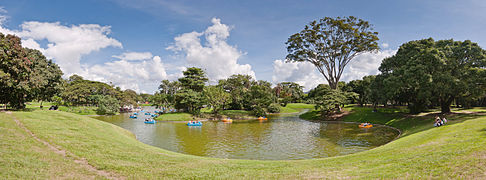Portal:Venezuela
The Venezuela Portal Venezuela, officially the Bolivarian Republic of Venezuela, is a country on the northern coast of South America, consisting of a continental landmass and many islands and islets in the Caribbean Sea. Venezuela comprises an area of 916,445 km2 (353,841 sq mi), and its population was estimated at 29 million in 2022. The capital and largest urban agglomeration is the city of Caracas. The continental territory is bordered on the north by the Caribbean Sea and the Atlantic Ocean, on the west by Colombia, Brazil on the south, Trinidad and Tobago to the north-east and on the east by Guyana. Venezuela is a presidential republic consisting of 23 states, the Capital District and federal dependencies covering Venezuela's offshore islands. Venezuela is among the most urbanized countries in Latin America; the vast majority of Venezuelans live in the cities of the north and in the capital. Economic shocks in the 1980s and 1990s led to major political crises and widespread social unrest, including the deadly Caracazo riots of 1989, two attempted coups in 1992, and the impeachment of a President for embezzlement of public funds charges in 1993. The collapse in confidence in the existing parties saw the 1998 Venezuelan presidential election, the catalyst for the Bolivarian Revolution, which began with a 1999 Constituent Assembly, where a new Constitution of Venezuela was imposed. The government's populist social welfare policies were bolstered by soaring oil prices, temporarily increasing social spending, and reducing economic inequality and poverty in the early years of the regime. However, poverty began to rapidly increase in the 2010s. The 2013 Venezuelan presidential election was widely disputed leading to widespread protest, which triggered another nationwide crisis that continues to this day. Venezuela has experienced democratic backsliding, shifting into an authoritarian state. It ranks low in international measurements of freedom of the press and civil liberties and has high levels of perceived corruption. (Full article...) Selected article -
Venezuela sent a delegation to compete at the 2006 Winter Olympics in Turin, Italy from 10 to 26 February 2006. This was the third time Venezuela had competed at a Winter Olympic Games. The Venezuelan delegation consisted of one luge athlete, Werner Hoeger. He finished 32nd in his only event, the men's singles. (Full article...)
Selected picture
Plaza Francia, also known as "Plaza Altamira", is a public space located in Altamira, east Caracas. It was built at the beginning of the 1940s and opened on August 11, 1945 with the name "Plaza Altamira". Its name was later changed due to an agreement between the cities of Caracas and Paris to have a Venezuela Square in Paris and a France Square in Caracas.
Selected biography -
Tarek William Saab Halabi (Spanish pronunciation: [taˈɾek 'wiljam ˈsa:β], Arabic: طارق وليام صعب حلبي; born 10 September 1962) is a Venezuelan politician, lawyer and poet. He was a leader of the Fifth Republic Movement (MVR) party founded by Hugo Chávez, President of Venezuela, who publicly called him "The poet of the revolution". He was the Governor of Anzoátegui from 2004 to 2012, and a member of the Committee for Justice and Truth since 2013. In December 2014, he was elected "People's Defender", or Ombudsman, by the National Assembly for 2014–2021 term. On 5 August 2017, the National Constituent Assembly appointed him as Attorney General in substitution of Luisa Ortega Diaz. (Full article...) In this month...
Did you know (auto-generated) -
Selected list -
Román Chalbaud worked in Venezuelan film, television and theatre, starting in 1951 and continuing to direct, write, and produce works until his death in 2023. Though most famous for his Golden Age films, he is also renowned in Venezuela as part of the "Holy Trinity" of theater for his contributions not only in playwriting, but also in direction and production. Besides these, he wrote and created many television series and telenovelas, and occasionally acted in both his own and his contemporaries' works. Chalbaud's continuing work into his old age may be due to his affiliation with the successive Venezuelan governments, which have funded his works since such programs began. (Full article...)
Current events
More did you know...
TopicsCategoriesRecognized content
Featured articlesGood articles
Featured pictures
New articlesThis list was generated from these rules. Questions and feedback are always welcome! The search is being run daily with the most recent ~14 days of results. Note: Some articles may not be relevant to this project.
Rules | Match log | Results page (for watching) | Last updated: 2024-06-26 22:13 (UTC) Note: The list display can now be customized by each user. See List display personalization for details.
Things you can doWikiProjects
Related portalsAssociated WikimediaThe following Wikimedia Foundation sister projects provide more on this subject:
Discover Wikipedia using portals |



